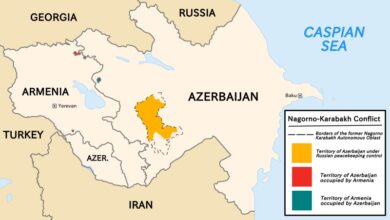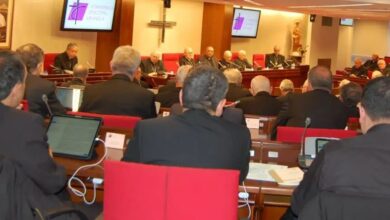German bishops to Church in Africa: Initiate canonization of German martyrs
 German martyrs who gave their lives in the service of the Gospel in Africa. Clockwise from top left to bottom right: Bishop Cassian (Franz Anton) Spiess, Father Karl Maria Weber, Brother Bernhard Ignatius Sarnes, Bishop Adolph Schmitt, Sister Magdala (Christa Elisabeth) Lewandowski, and Brother Heinz vom Kreuz (Heinz) Eberlein / Credit: ACI Africa/Martyrology of the German Bishops’ Conference
German martyrs who gave their lives in the service of the Gospel in Africa. Clockwise from top left to bottom right: Bishop Cassian (Franz Anton) Spiess, Father Karl Maria Weber, Brother Bernhard Ignatius Sarnes, Bishop Adolph Schmitt, Sister Magdala (Christa Elisabeth) Lewandowski, and Brother Heinz vom Kreuz (Heinz) Eberlein / Credit: ACI Africa/Martyrology of the German Bishops’ Conference ACI Africa, Mar 16, 2024 / 09:00 am (CNA).
A representative of the German Catholic Bishops’ Conference has challenged Church leaders in Africa to initiate canonization processes for the German martyrs who were violently killed in various African countries.
ACI Africa, CNA’s news partner in Africa, asked Father Helmut Moll, who has compiled biographies of more than 30 German martyrs who were reportedly victims of violence in Africa, what was being done to ensure their cause for canonization is opened.
“Your local Churches should ensure that these German martyrs are raised to the honor of the altars,” Moll replied, referring to the local ordinaries of the episcopal and metropolitan sees, as well as national bishops’ conferences, where the reported martyrdoms occurred.
As a starting point, he said, there is a need to translate the biographies of the Germans, who paid the ultimate price for evangelization in Africa, into African languages.
“Please translate the biographies of the African martyrs into your national language!” Moll urged during a March 7 interview, days after sharing the list of German martyrs killed in Africa. He said that currently these biographies “are being translated into Arabic, but there are difficulties with printing.”
Moll, a historian with prior experience serving in the Vatican Congregation for the Doctrine of the Faith as well as the Vatican Congregation for the Causes of Saints, started compiling biographies of the German evangelists at the request of the Catholic bishops in Germany.
The November 1994 apostolic letter of Pope John Paul II on the preparation for the Jubilee of the Year 2000, Tertio Millennio Adveniente, reportedly inspired the compilation of these biographies.
In the apostolic letter, Pope John Paul II said: “At the end of the second millennium, the Church has once again become the Church of martyrs. In our century, martyrs have returned, often unknown, akin to ‘unknown soldiers’ of the great cause of God.”
The German martyrs in Africa whose profiles have been documented include Father Franz Jäger, a member of the Oblates who was killed in 1905 in South West Africa during the Herero Uprising. South West Africa was a territory under South African administration from 1915 to 1990 and became the present-day Namibia.
Others include three Dominican missionaries who lost their lives in Rhodesia (present-day Zimbabwe) in 1977: Sisters Magdala (Christa Elisabeth) Lewandowski from Kiel, Epiphany (Berta) Schneider from Munich, and Ceslaus (Anna) Stiegler from the Upper Palatinate.
Other German-born evangelists who lost their lives were Benedictine missionaries, St. Benedictus Missionary Sisters of St. Ottilien who were killed in Tanzania, as well as a Sacred Heart Missionary priest and two Little Brothers of Charles de Foucauld, killed in Congo.
Moll told ACI Africa that he had contacted various religious and missionary orders who passed along the information about their members who were killed in Africa.
The German priest expressed optimism that German evangelists killed throughout Africa will revitalize the Church in Germany, noting that having paid the ultimate price, they “show the missionary zeal that is so important for our country today.”
Meanwhile, Moll, who has vast expertise in martyrology, has encouraged Christians in various African countries who are experiencing persecution because of their faith to embrace martyrdom with humility.
“Learn from these biographies,” he said of his list of the German martyrs who died for their faith far from their home country. “Accept the martyrdom of your members and raise them high as an example.”
Moll went on to challenge the Church in Africa to work toward ensuring that the sacrifice of those who give their lives for the sake of their faith is not forgotten.
“The bishops’ conferences in Africa are called upon to compile their own martyrologies so that missionaries and Indigenous people may become better known throughout the Catholic world,” Moll said.
This article was originally published by ACI Africa, CNA’s news partner in Africa, and has been adapted for CNA.





